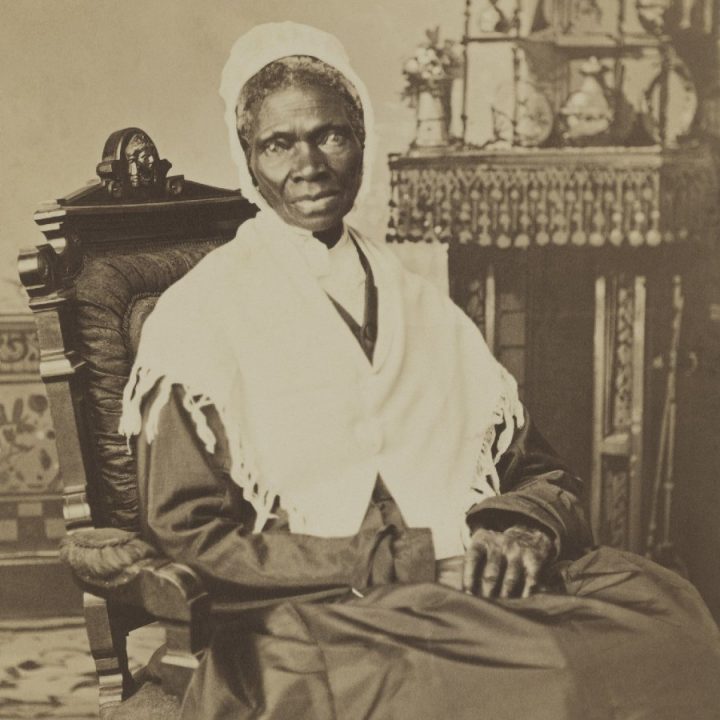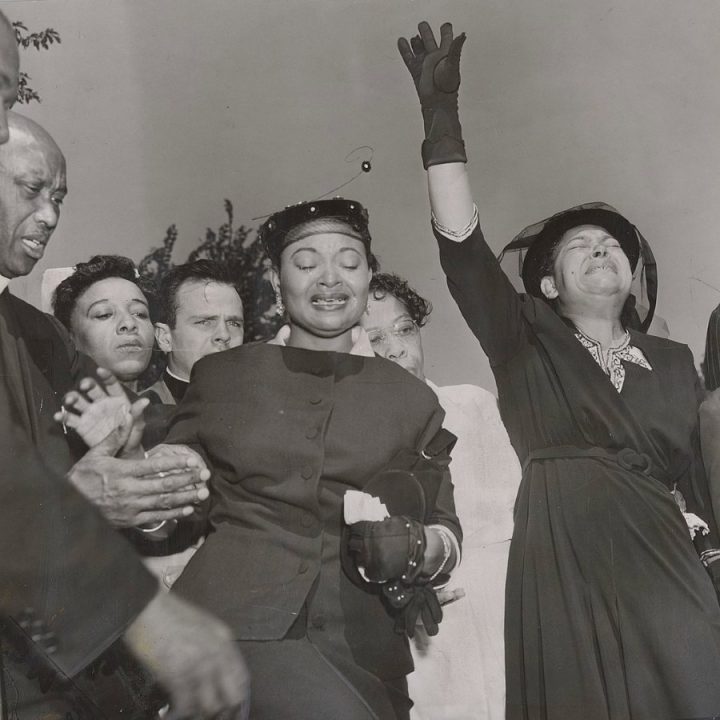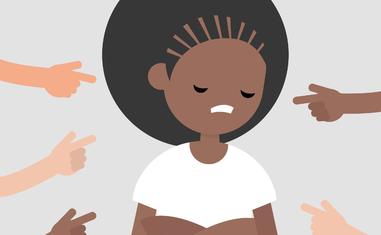The views expressed in our content reflect individual perspectives and do not represent the authoritative views of the Baha'i Faith.
“That man over there says that women need to be helped into carriages, and lifted over ditches, and to have the best place everywhere. Nobody ever helps me into carriages, or over mud-puddles, or gives me any best place! And ain’t I a woman?” asked Sojourner Truth in her famous speech at the Women’s Rights Convention in Akron, Ohio, in 1851.

In her speech, she repeatedly asked, “Ain’t I a woman?” to emphasize how Black women, who receive both racism and sexism, are treated differently than white women. This differential treatment is something Black women regularly experience — and studies show the negative effect of it.
I remember when my mom and one of my sisters helped me move to London to study abroad in 2017. After we arrived at the hotel in Islington, we were clearly struggling to lug in all our heavy bags and huge suitcases. People were coming and going at the entrance, passing us by, and no one offered to help us. I just assumed that this was the norm until I attended a gathering weeks later, with a group of mainly white British women, and they just happened to bring up how chivalrous British men were because they were always quick to offer to carry their things. I couldn’t help but think back to my moving-in experience and wonder: Did these men not help my family members and me because we are Black?
In 1938, Shoghi Effendi, the Guardian of the Baha’i Faith, wrote that racial prejudice is like “a cancerous growth.” It “has bitten into the fiber, and attacked the whole social structure of American society.”
So, it’s no wonder that I experienced several incidents like the one in London in other countries throughout Western Europe and back home in the United States. By reading about the intersectionality of racism and sexism, I’ve learned there are terms for the neglect and invisibility that Black women experience and the care, attention, and assistance that white women often receive: hostile and benevolent sexism.
Defining Hostile Sexism and Benevolent Sexism
Ambivalent sexism theory posits that sexism has two complementary and mutually reinforcing dimensions and components: hostile and benevolent. In 2015, Psychologists Jean M. McMahon and Kimberly Barsamian Kahn wrote in the journal “Group Processes & Intergroup Relations” that hostile sexism “characterizes women as easily offended, unappreciative of and seeking to gain power over men, and manipulative with their sexuality.” People who are hostile sexists express blatant negative and resentful attitudes toward women, especially when we reject or violate traditional gender roles and stereotypes.
RELATED: In Pursuit of Equality: 100 Years of Women’s Suffrage
“Benevolent sexism,” McMahon and Kahn explained, “places women on a pedestal and affirms their inherent purity, morality, and defenselessness. These attitudes arise from a desire to protect the beloved and weak…”
Their research, which consisted of mostly white male and female participants, showed that white women receive more benevolent sexism than Black women and are viewed as having more positive traits overall. What causes people to view white women much more positively than Black women and treat them differently?
Racial Stereotypes That Lead to Benevolent and Hostile Sexism
McMahon and Kahn explained that both Black women and white women “are stereotyped as childlike and emotional,” but there are significant differences in how they’re seen. Because of benevolent sexism, white women are “characterized as angelic.” In comparison, Black women are viewed through a hostile sexist lens as being “antagonistic, unmannerly, loud, aggressive, stubborn,” and sexually promiscuous.
The stereotype of the “angry Black woman,” for instance, has often been used to tone police Black women and silence them when they speak up about discrimination. Serena Williams’s controversial treatment during the 2018 US Open final is one recent, high-profile example of how Black women are punished in the workplace in ways that men and other women are not. During that final, the umpire penalized Williams with a code violation for allegedly receiving guidance from her coach in the stands and a penalty point for breaking her racquet — penalties often not given to male tennis players when they display similar (or worse) behaviors. When Williams asked the umpire to apologize to her, he responded by giving her a game penalty. Williams lost the match and was fined $17,000 for the penalties.
As law professor Trina Jones said in an interview with the BBC in 2018, “Black women are not supposed to push back, and when they do, they’re deemed to be domineering. Aggressive. Threatening. Loud.”
Along with being viewed as angry, Black women are also stereotyped as promiscuous temptresses who use their sexuality to exploit men’s weaknesses. This stereotype has been around since slavery when enslavers characterized Black women in this light to justify raping and torturing them. McMahon and Kahn added, “Black women’s sexuality has never been depicted as moral or demure, in stark contrast to white women’s. Indeed, the ideal virgin in the public consciousness and mass media is young and white — she is never a woman of color.”
This and other negative stereotypes, such as the mammy and Aunt Jemima images, remain prevalent in the media and entertainment industry.
Perhaps that’s one of the reasons why Baha’u’llah, the prophet and founder of the Baha’i Faith, wrote that:
it behoveth the writers thereof to be purged from the promptings of evil passions and desires and to be attired with the raiment of justice and equity. They should enquire into situations as much as possible and ascertain the facts, then set them down in writing.
And while there is the stereotype of the strong Black woman, this strength and independence violates “benevolent ideals of submissiveness and inherent fragility.” Unfortunately, it also makes Black women more likely to be the target of hostile sexism, without acknowledging that strong women are just as deserving of kindness and compassion.
Examples of How Benevolent Sexism Has Been Used to Justify Oppression
Benevolent sexism may explain why white female offenders get more lenient sentences than male offenders — leniency that is not given to women of color, and why white women who experience domestic violence are more likely to get help from the police than Black women.
RELATED: How Objectification Leads to Violence Against Women
These benevolent and paternalistic attitudes toward white women don’t only affect how Black women are treated. In the U.S., “the need to protect white women from ‘hypersexual’ and ‘ruthless’ minority men has been used to justify violence” against Black men throughout history.
For example, in 1955, two white men in Mississippi — Roy Bryant and his brother-in-law, J.W. Milam — were acquitted in the kidnapping and brutal murder of Emmett Till — a Black 14-year-old boy visiting from Chicago. A year later, protected by double jeopardy, they told “Look” magazine how they beat Emmett until his face was unrecognizable before they shot him in the head and dumped his body in the Tallahatchie River — all because a white woman named Carolyn Bryant lied and said that Emmett had grabbed her hand, clasped her waist, and told her that he had been with white women before. It wasn’t until 2017 that it became public that Carolyn Bryant confessed she made that story up. No one was ever punished for Emmett’s murder.

How Benevolent Sexism Harms White Women
Although white women sometimes benefit from being viewed through a paternalistic lens by the criminal justice system, this benevolent bias negatively affects white women too.
Research has shown that “Women exposed to benevolent sexism in a controlled setting show decreased cognitive performance, less motivation to engage in social activism that could benefit them, increased levels of body surveillance and shame, and greater system justification for the patriarchal status quo.” This “patriarchal status quo” is one that, albeit in varying degrees, halts humanity’s progress.
In a speech in 1912, Abdu’l-Baha, the son of Baha’u’llah and one of the central figures of the Baha’i Faith, said:
that until woman and man recognize and realize equality, social and political progress here or anywhere will not be possible. For the world of humanity consists of two parts or members: one is woman; the other is man. Until these two members are equal in strength, the oneness of humanity cannot be established, and the happiness and felicity of mankind will not be a reality.
Sexism, in all its forms, is not just or healthy for society. Whether it’s reflected in the belief that white women are weak and thus need to be protected and isolated, or the myth that Black women are sexual deviants that deserve to be exploited, it is clear that eliminating racial prejudice is an essential step towards true gender equality and humanity’s collective well-being.

















Comments
Sign in or create an account
Continue with Facebookor